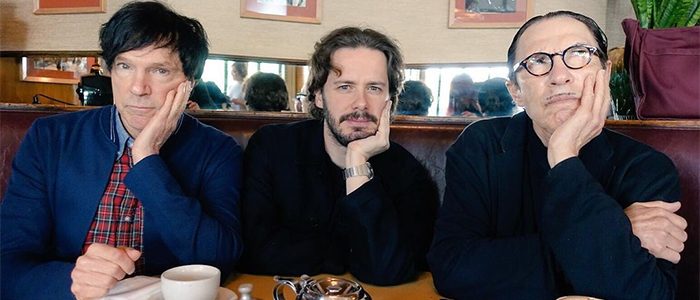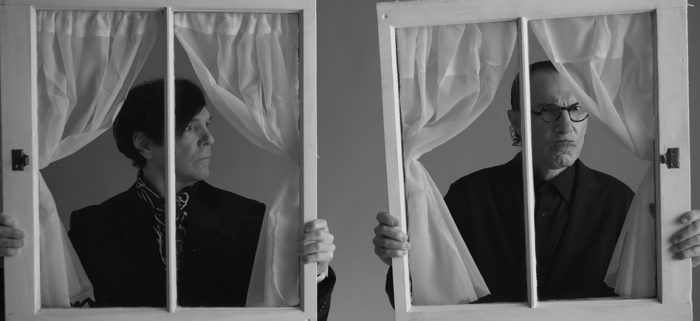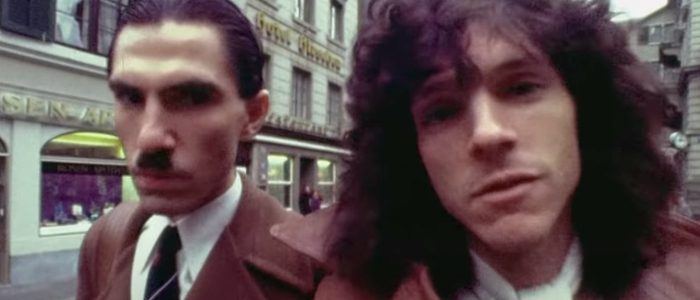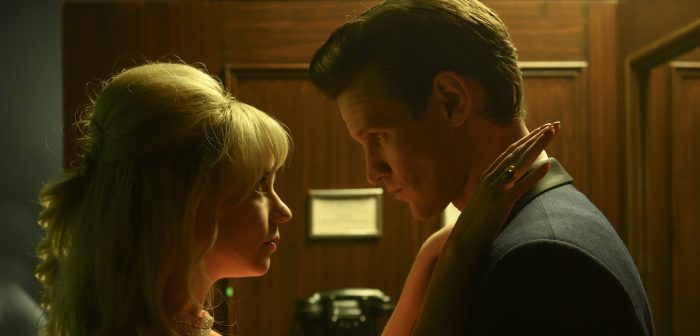
This week brings Edgar Wright‘s first feature documentary to theaters. The Sparks Brothers is a comprehensive, amusing, and wonderful documentary about the influential pop rock duo known as Sparks. If that name isn’t familiar to you, don’t worry. This film will tell you everything you need to know about Sparks, along with things people think they know about Sparks. And when all is said and done, you might just be a new fan.
When The Sparks Brothers debuted at the Sundance Film Festival earlier this year, we sat down to talk with Edgar Wright and Sparks (aka Ron and Russell Mael) about having a 50-year music career boiled down to a 140-minute documentary, and playing with the traditional style of music documentaries. Plus, we talk about some of the fun “facts” that have been spread around about the duo over the decades and whether there might be another collaboration between them in the future.
Edgar, it’s great to see you venture into the documentary realm. As somebody who wasn’t familiar with Sparks, I especially liked seeing how your filmmaking sensibilities mesh with the musical style of Sparks. Though they take music seriously, there’s a comedic side to it there too. Similarly, you have a serious passion for cinema, but you also get cheeky with your approach to genres where it’s not quite parody but homage with purpose. Is that correlation something that drew you to making a movie about Sparks?
Edgar Wright: I mean, if the pull quote is Edgar Wright is the Sparks of film directors, I’m happy with that. I think, in a weird way, it’s funny, I think that became more apparent to me as I was making it. My knowledge of Sparks had started when I was five years old and in terms of just seeing them on a TV show and then later having a record and being, over the years, constantly sort of intrigued and beguiled. And then sort of continually left impressed. I was just dumbfounded that they seem to kind of go against the trajectory of any other band. And that was kind of fascinating to me. Ultimately what made me want to make the documentary is, I felt partly like an evangelist for their work and also because there were questions that I wanted answered as well.
When I approached the way of doing the documentary, I thought that it should be done in a Sparks style, which is with utter sincerity and yet still with this irreverent kind of perspective on it. I think that’s what’s great about Sparks, is that it’s done with utter sincerity. Then there’s also a sort of feeling that maybe they’re also commentating. Like Ron says in the film, he’s talking about Jean Luc Godard, who manages to sort of make movies and also comments on making movies at the same time. I think that’s very true of Sparks’ music. And I think it’s probably true of what I do as well. It’s sort of coming from a place of like, if there is any sort of pastiche or kind of like satiric approach to the material, it’s done out of complete admiration.
Yeah, absolutely. You can see that with little things throughout this documentary, such as when you’re identifying the people who you’re interviewing. In the lower third you list “Beck, see above.” And then labeling Nick Rhodes and John Taylor each as “Duran” and “Duran.” I love those extra touches.
Wright: To be honest, I’m just happy that Ron and Russell were okay with me calling them “older male” and “younger male.”

Ron and Russell, were there any hesitations about having a feature film made about you, diving into some of the things that have maybe been more mysterious about the Sparks over the years?
Ron: Previous to Edgar, we had huge hesitations. We have been approached in the past, and we always felt that it would be, I don’t know, in some ways too specific. We always felt that the music was speaking for what we were, in ways that are all the ways that we want to be seen. But, Edgar, we were familiar with all of his films and his sensibility. And when we first met him and [saw he is] just passionate about the band, we kind of dropped our guard, and we’re so pleased with the outcome. And knowing that this will be the only Sparks documentary is something really amazing to us.
Russell, there’s an interesting detail in here in the credits where it says you have uncredited roles in 27 animated movies. Is that true or is that something cheeky?
Russell: Oh, wow. Yeah, we need to figure out how we answer whether those are true or not. I think some of them are fantasy-like comments. So that one, it’s maybe not true.
See, again, that’s one of the things that I love about this documentary. You guys have so much fun with your story. Edgar, you just mentioned the Godard-kind of influence on the Sparks work and how it also translates to this film. Is that also why you chose to shoot the interviews in black and white?
Wright: Not specifically. Actually it was because I think a really iconic cover of a Sparks album is the cover for Big Beat from 1976 which is the Richard Avedon cover. Like a black and white photo. And so I kind of figured, I said to the [director of photography] Jake Polonsky, I said, “Oh, let’s just shoot all of the interviews like it’s the Big Beat cover, like it’s the Big Beat session.” So it was like Richard Avedon-style with the gray background.
Just to go back to what you were saying about [having fun with the material]. The idea of kind of the Sparks facts at the end [of the movie] is because through Ron and Russell’s career, and this is like in a pre-Internet age where you can get away with this kind of thing, there were various Sparks facts that were out there in the universe, which maybe weren’t entirely true.
Like one of the big ones being that Ron and Russell were actually Doris Day’s sons. A bit of like, sort of fiction put out by their publicists, which then kind of just, in a pre-Internet age, just goes around. And there’s people saying, “Oh, it’s you, hey it is Sparks! Doris Day sons!” So we figured, having pulled back the curtain to some extent on Sparks, the way to kind of recapture the enigma in the final seconds was to put out a whole bunch of other bullshit. [laughs]
Ron: The German lexicon actually lists my real name as Dwight Ronald Day.
Wright: Oh really, I didn’t know that!
Ron: Yeah. So you really have to be careful about those moments where you think it’s only one interview, and then it turns out to be your entire life in Germany.
Wright: Listen, Doris Day is no longer with us. So she can’t fact check it. So who’s to say it’s not true.
Ron: That’s right. There you go.
Russell: Start it up again, keep it going.
Edgar, how do you even embark on a documentary like this, with a band whose career spans 50 years? I can’t imagine how daunting of a task this is. How did you figure out how to approach this?
Wright: What’s great about this documentary, what was great for me, and what’s different from sort of a lot of other musical documentaries, is, for the most part, a lot of musical documentaries that you see are about bands that are no longer active. Sometimes the people are not alive. And you’re talking about something in the past tense. So the gift of this is obviously Ron and Russell are not only with, but also Sparks are very much a going concern, having just released their 25th album last year. Also, a lot of people who worked on the first album in 1971 are also still working. So to me, it was a no-brainer, beyond having access to Ron and Russell, to do an oral history.
And then it sort of became bigger as it went along, because there wasn’t anybody that I didn’t want to interview. Basically anybody that wants to talk about Sparks, I wanted to hear from them. Very quickly, once we announced we were doing it and started reaching out to people. It was very easy to get people on board. And it sort of speaks to Ron and Russell and their influences, and how beloved they are by their fans, even famous fans, that everybody wanted to talk about it. In some cases there were people that I knew were fans of Sparks, that were knowledgeable fans, like Steve Jones or Vince Clark, or like Duran Duran, John and Nick from Duran Duran.
There were other people that I just assumed were Sparks fans and more often than not, I was right. It’s like a thing where I could say to Neil Gaiman, “You like Sparks, right?” “Yes. I love Sparks.” Or to Mike Myers, “Hey, are you a Sparks fan?” “I love Sparks.” Or to Beck or to Flea. Or to Patton Oswalt or to Scott Auckerman. You can kind of just tell by people’s sensibilities in what they do, who may or may not be a Sparks fan. And I was very rarely wrong. So some of those things are just cold calls, like saying, “I’m doing a documentary about Sparks. I’m guessing you’re a Sparks fan.” And that was an amazing thing. I think Ron and Russell, as they can attest, were sort of blown away when they saw the finished thing, because quite a few of the talking heads in the movie, Ron and Russell have never met. Which is amazing. [speaking to Ron and Russell] I introduced you to Beck in the UK, which considering that you’re both from the LA scene, I found sort of amazing that you’d never met in person. So it was a pleasure to sort of connect the dots.

Ron and Russell, what was the most surprising or gratifying thing to hear from some of these people that you hadn’t met before and then saw in the movie?
Ron: Well, the fact that they actually knew that we existed was something that was uplifting to us. We’ve crossed paths with different people where you say hello at the airport or something. But to actually know that people like Flea or Beck, that the music, in a certain measure, means something to them, it’s really inspiring to us. Because we do work pretty isolated from other musicians, and from other people, but from other musicians in particular. So to know that these people were not only moved by us in a certain way, but willing to speak about it – there have been things in the past were where we knew people knew about us and were influenced by us, but weren’t willing to actually say it. And Edgar was able to get all these people to actually open up and talk about it. So, just in an ego way and in an inspirational way, it really meant a lot to us.
Russell: I think also the variety of creative areas that all the people come from was something that was really a surprise, happily surprising to us too. It was not only musicians that Edgar contacted, but also writers. Neil Gaiman, we would never in a million years have thought, “Wow, Neil Gaiman not only likes Sparks but can speak articulately about lyrics and album covers of the band.” And television people like the Palladinos from Gilmore Girls. And actors like Mike Myers. It kind of did our heads in a bit knowing that these people from very creative areas were acknowledging the band in such a really great way. So it was pretty amazing.
So you had that unfortunate experience in Hollywood with a project that didn’t get off the ground, but thankfully you were able to work on another one recently with Annette coming out. Now that you’ve worked with Edgar, is there any chance youa might collaborate again on something other than this documentary in the future? Some kind of other movie or TV series maybe?
Ron: We’re listening,
[Everyone laughs]
Wright: Let’s just point out that, in the documentary, there’s a film with Jacques Tati in the seventies, which, if it had happened, would have obviously been amazing. Then also there’s the Tim Burton film in the eighties, Mai, the Psychic Girl. Then also, which we don’t cover other nearly-there projects with a Tsui Hark and Guy Madden. But it is worth pointing out, in 2021, after 50 years, there were two Sparks films in one year, because there’s our documentary and the Leos Carax film, Annette. So that’s pretty good going, so that you wait like five decades for a Sparks film, and then two come along at once. That’s not to say that we can do something else, a third one.
I know that you shot concert footage a couple years ago, back around when the project was first announced. Is there any thought of turning out a concert documentary, like showing off that whole performance?
Wright: That’s a good question, actually. I thought, once we release the documentary, sometime later this year, if we did a DVD or something, I do have an entire concert that I shot. Because the concept footage towards the end, from the Hippopotamus Tour, was the first thing we shot for the documentary. We shot an entire gig in London, which is great. So there is like a kind of 80-minute sort of concert, which I hope that we’ll do something with that, even if it’s just as an extra on the disc or as part of like a package on streaming or whatever. So there is something that is in the can.
What’s funny actually, I did have a thought when I was making it, because Ron and Russell are so prolific that they had a new album out last year. And I thought, “Oh, my documentary is going to seem out of date because they’re going to be touring the new album, and we won’t feature any of that stuff.” And then lock down happened. And as it turned out, I did film the last Sparks gig. Because the footage from Mexico, which is the first time that Sparks had ever played Mexico – you’d played as FFS with Franz Ferdinand, but never played in your own right. We happen to be there and shoot that footage. So I actually, weirdly, have the last pre-lockdown live footage of Sparks.

Edgar, you’ve been very outspoken supporting cinemas during the pandemic. Last Night in Soho just got pushed back, and you’re still very much dedicated to releasing it in theaters. Can you talk a little bit about what it is about Last Night in Soho that you’re so excited for audiences to experience on a big screen in theaters in the fall?
Wright: I got quite a few emails from people saying like, “Oh, you must be so gutted that it’s got pushed again.” And I was like, “No, I was the one who suggested pushing it.” Because I’m a big supporter of cinemas. I just did a whole article with Empire with 40 other filmmakers talking about our personal experiences of the cinema. I felt that there had been a lot of doomy, pessimistic sort of articles about exhibition, usually written by people who A: have not been in the cinema with a paying audience for like 10 years. (And I don’t count premieres or festival screenings). And B: people who have vested interests in other sort of channels. And I think that is out there, an audience that loves seeing things on the big screen and love seeing things with other people. I was kind of annoyed that there was always the narrative that that was something of the past when you think, in 2019, even in early 2020, there were big box office hits, like massive box office hits.
So I am so dedicated to say, safely, obviously, I would love the vaccine to get around and things to return to normal. And aside from being a filmmaker, I will be one of those first audience members back. Having finished Last Night in Soho and done an amazing Dolby Vision, Dolby Atmos version, I’d like people to see this on the big screen or certainly have the option to see it on the big screen. So I’m very much a believer in the theatrical experience. I think having been in lockdown and watched maybe about 350 films in the last 12 months, I can conclusively say that I prefer watching things at the cinema.
Can we get an update on any of the many projects that you’ve been attached to?
Wright: I’d say with all of them, I’m in the process now of sort of writing and developing. In terms of what the next film is, that’s partly a practical question. Let me just say this: all the things I’m working on are all great projects. And so especially in this age that we live in, there’s sort of practical aspects to it as well. So I’m not entirely sure what the next one is, but they’re all great projects and I am getting back into them as we speak.
The Sparks Brothers arrives in theaters on June 18, 2021.
The post ‘The Sparks Brothers’ Director Edgar Wright on Playing With What a Music Documentary Can Be [Interview] appeared first on /Film.
0 Comments